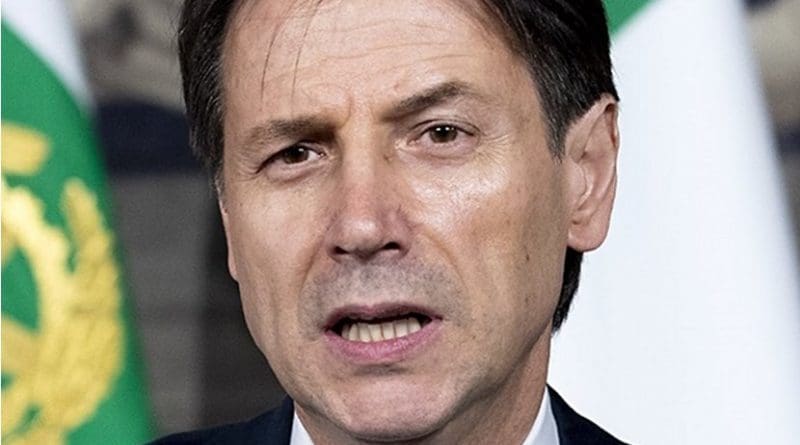Italy’s PM Can Expect 5-Star White House Welcome – OpEd
By Arab News
By Andrew Hammond*
The new Italian Prime Minister Giuseppe Conte, who meets US President Donald Trump on Monday at the White House, is already emerging as Trump’s strongest supporter in Western Europe with speculation over a potential populist Washington-Rome axis underpinned by disruptive diplomacy.
While Trump has met Conte only twice, at the recent G7 and NATO summits, he has already declared him “a really great guy” and said he “will do a great job — the people of Italy have got it right.” This political affinity rests not just on apparent personal chemistry (Conte has been called Trump’s new “favorite”), but also the alignment of their policy positions of key issues such as Russia and immigration.
On Russia, Conte backed Trump’s remarkable call in June for Moscow to re-enter the G7, a proposal rejected summarily by all the other members of the club of western powers. The Italian premier’s support for the US president on this controversial issue reflects the fact that the two anti-establishment political parties which comprise the Italian government — The League and 5-Star — have long sought a re-evaluation of Rome’s relationship with Moscow, including a call for the lifting of EU sanctions.
The Italian government’s support for Russia may, in the future, provide diplomatic succor for Trump as he attempts an apparent rapprochement with Vladimir Putin. Especially after the Helsinki summit, Trump is under renewed US political pressure over his stance toward Moscow, not to mention the continued scrutiny over the congressional and FBI investigations into alleged collusion with Russia during the 2016 US presidential campaign.
Another key issue on which Trump and Conte appear as one is immigration. Trump has expressed support for the Italian government’s high-profile attempts to toughen EU asylum migration policy, in which Conte (with support from fellow populists such as Hungarian Prime Minister Victor Orban) has aligned against other key European leaders, especially Angela Merkel and Emmanuel Macron.
While Italy is not always seen as being among the top-tier global powers, the reason the Trump-Conte relationship could have significant implications is Italy’s continued systemic importance in Europe. A G7 country, it is the third-largest Eurozone economy and poses perhaps the biggest threat to the single currency area’s future.
This is because Italy has the second-biggest debt load in the Eurozone at over 130 percent of GDP, and its banking sector is under significant stress with massive under-performing loans. This is in part why the formation of the 5 Star-League administration, with its expansionary fiscal plans, sent shockwaves across the EU this year.
Within the White House, it is not just Trump who has heaped praise on Conte. US national security adviser John Bolton sent a clear message of political support by visiting Rome this month to meet Conte, Defense Minister Roberta Pinotti, and Interior Minister Matteo Salvini.
Moreover, Trump’s former senior adviser Steve Bannon — after he left the White House — actively campaigned in the Italian election this year. Bannon believes the “populist, nationalist revolt” in the EU is about 18 months to two years ahead of the US, and he has claimed credit for bringing the League and 5 Star together as a governing coalition.
As a next step, Bannon now has ambitions to develop a European populist, right-wing “supergroup” ahead of next year’s European Parliament elections. His view is that, post-Brexit, Italy is “in the vanguard of change in Europe” along with other leaders such as Orban underlining that EU populations “want their countries back” and now is the time for a movement that might become a clearing house for the populist, nationalist movement in the continent.
Here, the Italian government can provide significant support for Bannon’s agenda. The League and 5 Star have no great love for the Brussels-based club, not least after they accused it of “unacceptable interference” in the Italian coalition negotiations this year.
League leader Salvini has previously asserted that he wishes Italy to leave the EU, and 5 Star has called for a referendum on whether the nation should keep the euro single currency.
This, of course, is completely aligned with Trump’s own agenda. Despite last week’s fragile EU-US agreement to have “talks about talks” over trade, the US president remains a big critic of the bloc. Not only has he called for more “Brexits,” he also has called the EU a US “foe,” and there is little doubt that such rhetoric will embolden the new Italian administration in its dealings with Brussels.
Monday’s meeting could therefore be the latest sign of a resurgent Italian-US political relationship. While the two nations have long been allies, the populist stripe of the administrations in Rome and Washington has brought new spice to bilateral bonds that could have significant international implications in Europe and beyond.
*Andrew Hammond is an Associate at LSE IDEAS at the London School of Economics

